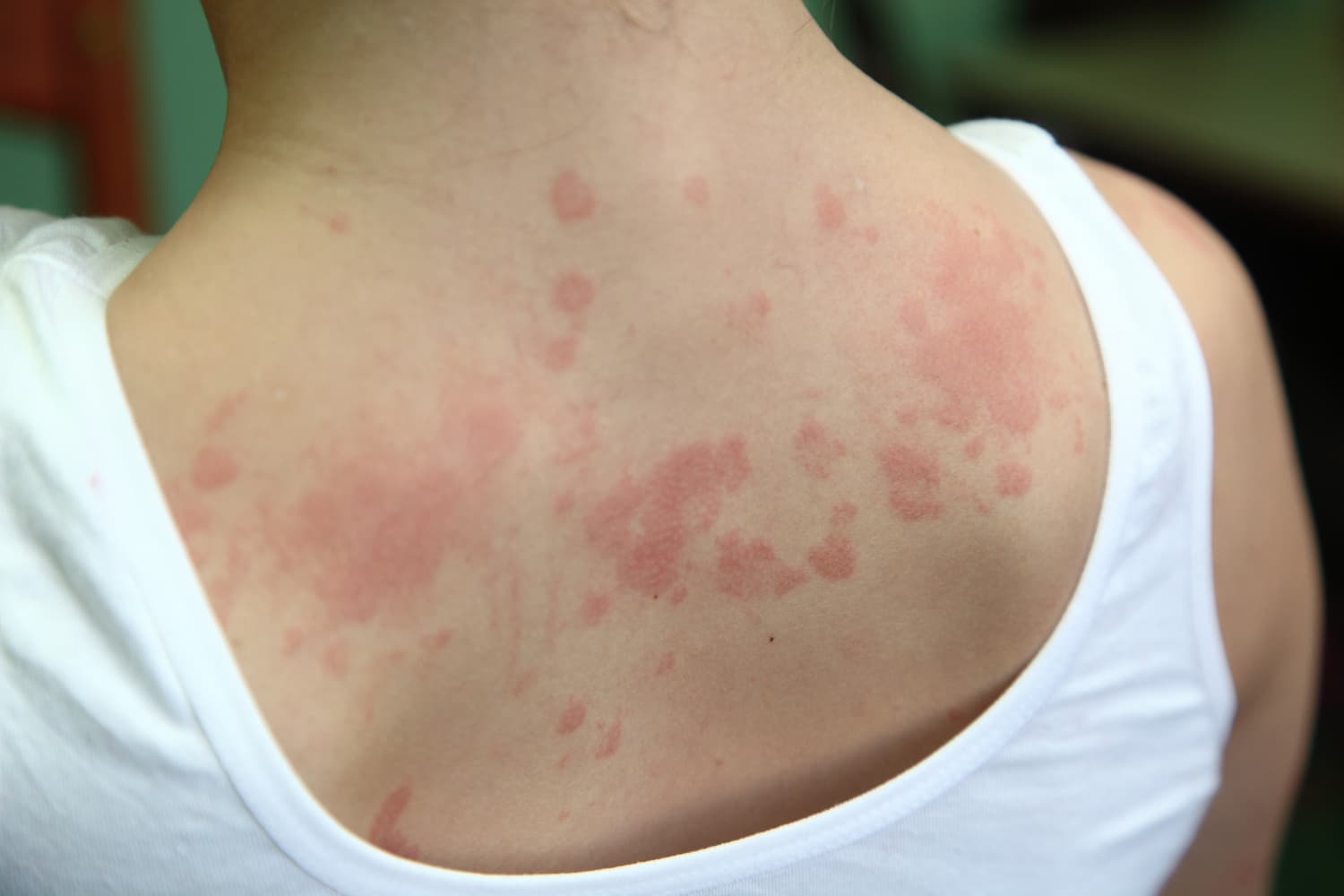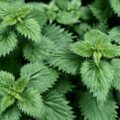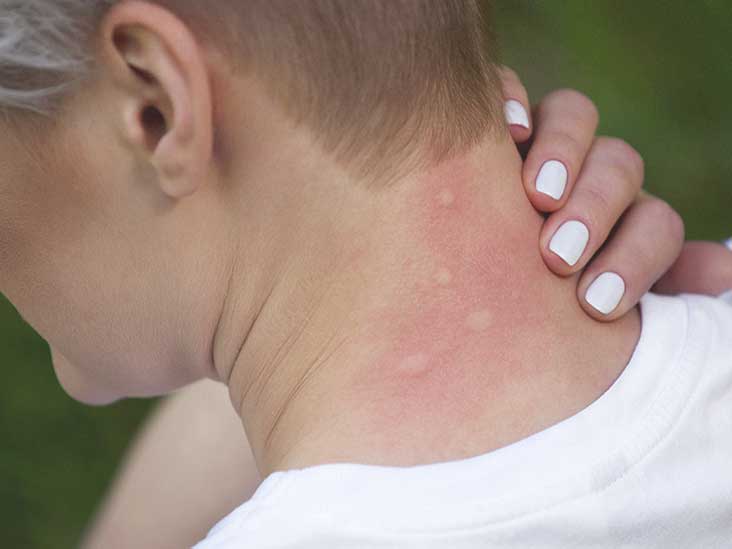Urticaria, Rashes, Itching, Skin Rashes, Weals, Welts, Nettle Rashes, Stress Rashes, Heat hives, Hives Treatment, Urticarial Rashes, Dermatographic Urticaria, Hives Rash, Hives treatment, Cold Urticaria, Hives on face.
Root Cause of Chronic Urticaria
Urticaria (also known as short-term urticaria) is a common condition, estimated to affect around 1 in 5 people at some point in their lives. If you’ve had red or skin-colored bumps that appeared and disappeared quickly, then it’s unlikely to be simple bug bites. The skin rash could be hives, and the itching from hives may range from mild to severe. Hives, also known as urticaria, affect about 20 percent of people at some time during their lives. Scratching, alcoholic beverages, exercise and emotional stress may worsen the itching.
Symptoms
Symptoms can last anywhere from minutes to months – or even years. While they resemble bug bites, hives (also known as urticaria) are different in several ways:
- Raised itchy bumps, either red or skin-colored
- “Blanching” (when pressed, the center of a red hive turns white)
- Hives can appear on any area of the body; they may change shape, move around, disappear and reappear over short periods of time.
- The bumps – red or skin-colored “wheals” with clear edges – usually appear suddenly and go away just as quickly.
- Pressing the center of a red hive makes it turn white – a process called “blanching.”
Chronic hives are different than acute hives:
- Acute hives start to fade within 24 hours (although new hives may replace them). They are gone within six weeks. A recent viral infection often causes acute hives.
- Chronic hives are visible at least twice per week for more than six weeks. Some chronic hives last for months or years. The cause is often unknown.
Certain triggers may also make the symptoms worse. These include:
- Drinking alcohol
- Drinking caffeine
- Emotional stress
- Warm temperature
Causes
Hives are usually caused by an allergic reaction to something that you have encountered or swallowed. When you have an allergic reaction, your body begins to release histamines into your blood. Histamines are chemicals your body produces in an attempt to defend itself against infection and other outside intruders. Unfortunately, in some people, the histamines can cause swelling, itching, and many of the symptoms that are experienced with hives. In terms of allergens, hives can be caused by factors such as pollen, medications, food, animal dander, and insect bites.
The welts that come with hives are caused by the release of immune system chemicals, such as histamine, into your bloodstream. It’s often not known why chronic hives happen or why short-term hives sometimes turn into a long-term problem.
The skin reaction may be triggered by:
- Heat or cold
- Sunlight
- Vibration, such as caused by jogging or using lawnmowers
- Pressure on the skin, as from a tight waistband
- Medical conditions, such as thyroid disease, infection, allergy and cancer
Home Remedies for Chronic Urticaria
Remedy – 1: Oat meal bath
Materials: Oat meal

Oatmeal bath helps unless you have hives that are triggered by cold (which is rare), take a cool bath or apply a cold compress. Cold shrinks the blood vessels and blocks further release of histamine. To further relieve itching, add colloidal oatmeal (like Aveeno) to the bathwater and soak for 10 to 15 minutes. (Be careful getting out of the tub, however—that fine-ground oatmeal turns slippery.)
Product link: Colloidal oatmeal
Remedy – 2: Try a Common Weed
Materials: Nettle leaves
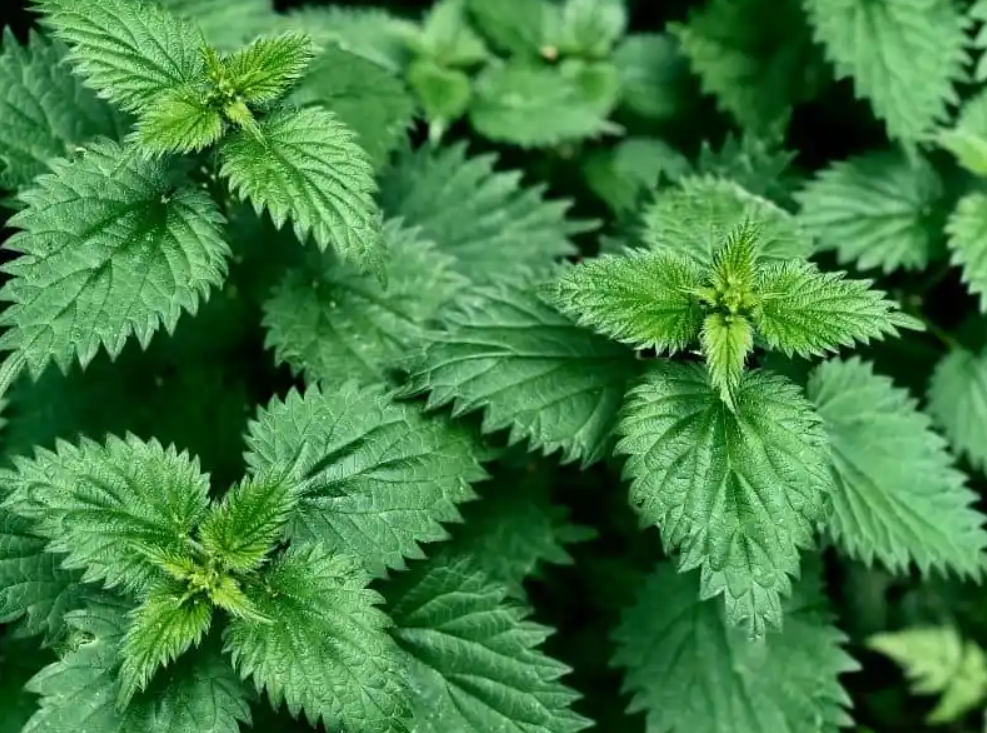
Nettle Leaf is the best alternative to antihistamines. Take up to six 400-milligram capsules a day. Or pick a few handfuls of the weed, steam, and eat. Wear gloves, long pants, and long sleeves to guard against nettle’s stinging leaves.
Product link: Nettle Leaves
Remedy – 3: Fish and Vitamin C

Fish oil can be consumed in capsule form three times a day about 1000 milligrams.. These capsules contain essential fatty acids that have anti-inflammatory properties. Cold-water fish like salmon, bluefish, and albacore tuna are good food sources.
Take 1,000 milligrams of vitamin C three times a day. At this dose, the “sunshine vitamin” has an effect that mimics the action of antihistamines. Don’t take more than 1,000 milligrams a day or you might experience diarrhea
Product links: Fish oil, Vitamin C
Remedy – 4 : Take Steps to Stop Stress
Materials: Chamomile
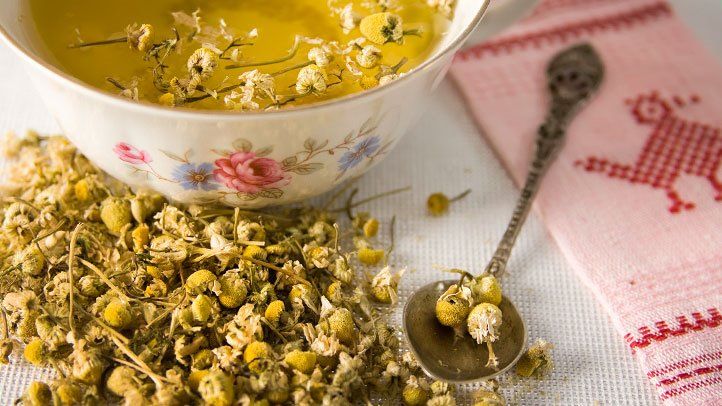
Stress can cause hives or make them worse. If your tension needs taming, master a nerve-calming technique such as meditation, yoga, or progressive relaxation.
Brew up a cup of chamomile, valerian, or catnip tea. All of these herbs have a sedative effect that may soothe your stress—and therefore your hives. To make the tea, stir one teaspoon of the dried herb into one cup of boiling water, steep 10 minutes, strain out the plant parts, and drink the tea.
Product links: Chamomile
Other Remedies
Mint
Mint has a cooling effect which makes it a good home remedy for hives. Steep 2 teaspoons of freshly crushed mint leaves in one cup of boiling water for 5 minutes. Strain it and put the liquid in the refrigerator. You should use this cold mint water to wash the irritated and inflamed skin several times per day.
Aloe Vera
Aloe Vera is one of the best home remedies for hives. It has anti – microbial and anti – inflammatory properties which can help to reduce itching, inflammation and redness when they are applied topically. Also when this home remedy is taken internally, then it can stimulate immunity and it can help to eliminate inflammatory toxins. You should apply fresh Aloe Vera gel to the affected skin. You should let it stay there for fifteen minutes and then you should rinse it off with lukewarm water.
You should follow this home remedy several times per day until your skin is completely healed. Also you can drink 2 tablespoons of Aloe Vera juice every day because this can boost your immune system. Women who are pregnant, breastfeeding and children should avoid this home remedy.
Basil
Basil is a works as a natural antihistamine and it is a very effective home remedy for hives. Also it can effectively combat inflammation and itching. You should put one tablespoon of dried basil leaves in a jar and then you should add hot water to it. You should cover the jar and you should allow it to cool. You should apply this mixture on the affected area using a cotton cloth. You should crush some fresh basil leaves with your hand. You should gently apply them on the hives.
You should allow them to dry and then you should rinse off your skin using lukewarm water. You should follow either of the mentioned home remedies as many times as you need until you get a relief.
Preventions
To lower your likelihood of experiencing hives or angioedema, take the following precautions:
- Avoid known triggers: If you know what has triggered your hives, try to avoid that substance.
- Bathe and change your clothes: If pollen or animal contact has triggered your hives in the past, take a bath or shower and change your clothes if you’re exposed to pollen or animals

